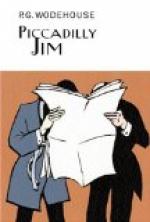It was not immediately that the practical or financial aspect of the affair came to scourge him. For an appreciable time he suffered in his self-esteem alone. It seemed to him that all these bustling persons who passed knew him, that they were casting sidelong glances at him and laughing derisively, that those who chewed gum chewed it sneeringly and that those who ate their cigars ate them with thinly-veiled disapproval and scorn. Then, the passage of time blunting sensitiveness, he found that there were other and weightier things to consider.
As far as he had had any connected plan of action in his sudden casting-off of the flesh-pots of London, he had determined as soon as possible after landing to report at the office of his old paper and apply for his ancient position. So little thought had he given to the minutiae of his future plans that it had not occurred to him that he had anything to do but walk in, slap the gang on the back, and announce that he was ready to work. Work!— on the staff of a paper whose chief diversion appeared to be the satirising of his escapades! Even had he possessed the moral courage—or gall—to make the application, what good would it be? He was a by-word in a world where he had once been a worthy citizen. What paper would trust Piccadilly Jim with an assignment? What paper would consider Piccadilly Jim even on space rates? A chill dismay crept over him. He seemed to hear the grave voice of Bayliss the butler speaking in his car as he had spoken so short a while before at Paddington Station.
“Is it not a little rash, Mr. James?”
Rash was the word. Here he stood, in a country that had no possible use for him, a country where competition was keen and jobs for the unskilled infrequent. What on earth was there that he could do?
Well, he could go home. . . . No, he couldn’t. His pride revolted at that solution. Prodigal Son stuff was all very well in its way, but it lost its impressiveness if you turned up again at home two weeks after you had left. A decent interval among the husks and swine was essential. Besides, there was his father to consider. He might be a poor specimen of a fellow, as witness the Sunday Chronicle passim, but he was not so poor as to come slinking back to upset things for his father just when he had done the only decent thing by removing himself. No, that was out of the question.
What remained? The air of New York is bracing and healthy, but a man cannot live on it. Obviously he must find a job. But what job?
What could he do?
A gnawing sensation in the region of the waistcoat answered the question. The solution—which it put forward was, it was true, but a temporary one, yet it appealed strongly to Jimmy. He had found it admirable at many crises. He would go and lunch, and it might be that food would bring inspiration.
He moved from his doorway and crossed to the entrance of the subway. He caught a timely express, and a few minutes later emerged into the sunlight again at Grand Central. He made his way westward along Forty-second Street to the hotel which he thought would meet his needs. He had scarcely entered it when in a chair by the door he perceived Ann Chester, and at the sight of her all his depression vanished and he was himself again.




